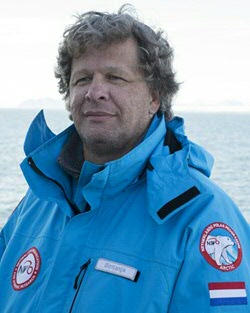Increased Arctic precipitation slows down sea ice melting
What are the effects of increased Arctic precipitation (up to 60% in 2100) due to climate change on Arctic sea ice? This is a question concerning many scientists. In a publication in Oceanography , Honorary Professor of Climate and Environmental Change Richard Bintanja explains that this increased precipitation actually counters the effects of global warming. He believes that the increased precipitation leads to less salty ocean surface waters. This layer hinders the warmth of deeper ocean layers reaching the surface, which leads to a cooler ocean surface (compared to a hypothetical situation without extra precipitation) and sea ice expansion.
According to these new findings, increased precipitation will slow down the warming in the Arctic and thus to a certain extent also the melting of the sea ice. This surprising result underlines the complex link between the changing hydrological cycle in the Arctic and climate itself.

More news
-
15 September 2025
Successful visit to the UG by Rector of Institut Teknologi Bandung
